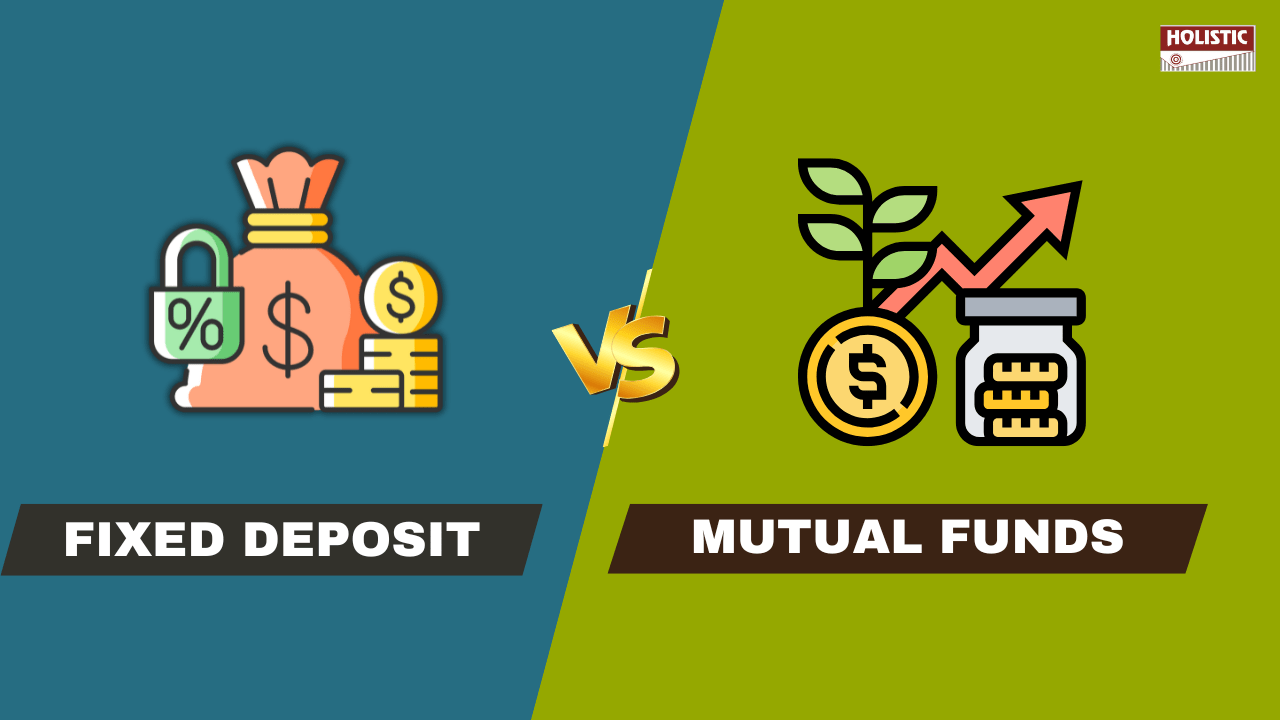Table of Contents:
- Introduction
- What is a Fixed Deposit (FD)?
- What is a Mutual Fund?
- FD vs Mutual Funds: A Comparative Analysis
- FDs vs Mutual Funds: Which One Should You Choose?
- Final Thoughts
Introduction
Should you park your money in a safe and predictable FD, or should you take a calculated risk with mutual funds for potentially higher returns?
This is a question that every investor faces at some point.
While FDs have been the traditional go-to choice for Indian investors due to their stability, mutual funds offer the opportunity for better growth and wealth creation.
But does that mean FDs are outdated?
Or that mutual funds are too risky for conservative investors?
Let’s break it down and help you make an informed decision.
What is a Fixed Deposit (FD)?
A Fixed Deposit (FD) is one of the simplest investment options, where you deposit a lump sum with a bank or an NBFC for a fixed period and earn a predetermined interest rate.
But is simplicity enough when it comes to building wealth?
The beauty of an FD is that it guarantees fixed returns and protects your principal amount.
No matter what happens in the stock market, your FD remains unaffected.
Sounds reassuring, right?
But does this stability come at the cost of missing out on better returns?
Benefits of Fixed Deposits
✔ Guaranteed Returns – Wouldn’t it be great to have an investment where returns are unaffected by market ups and downs? That’s exactly what an FD offers!
✔ Low-Risk Investment – Afraid of market volatility? With FDs, you don’t have to worry about stock crashes or interest rate fluctuations impacting your savings.
✔ Flexible Tenure – Need to invest for just a few months or looking for a longer commitment? FDs give you the flexibility to choose your term from a few months to 10 years.
✔ Higher Interest Rates for Senior Citizens – Why settle for lower returns when banks offer an extra interest rate for senior citizens? It’s a safe and rewarding choice for retirees.
✔ Tax Benefits – Want to save on taxes? Tax-saving FDs under Section 80C allow you to deduct up to ₹1.5 lakh from your taxable income. But is that enough to make FDs the best choice?
Who Should Invest in an FD?
- Risk-averse investors who want guaranteed returns.
- Senior citizens looking for a stable and safe income source.
- Investors with short-term financial goals who can’t take risks.
- Taxpayers who want to claim deductions under Section 80C.
What is a Mutual Fund?
Ever wondered how professional investors manage to grow their wealth faster?
The answer often lies in mutual funds.
A mutual fund pools money from multiple investors and invests in a diversified portfolio of stocks, bonds, or other securities.
Unlike FDs, mutual funds don’t offer a fixed return—instead, they grow with the market.
But does that mean they’re too risky?
Not necessarily.
Mutual funds come in different types, catering to both conservative and aggressive investors.
Benefits of Mutual Funds
✔ Higher Return Potential – Can your FD match the long-term return potential of mutual funds? Not really! Mutual funds, especially equity funds, have historically delivered inflation-beating returns.
✔ Diversification – Why put all your eggs in one basket? Mutual funds spread investments across different sectors and assets, reducing overall risk.
✔ Professional Fund Management – Do you have the time to track the stock market daily? If not, a fund manager does it for you—analyzing and selecting the best investments.
✔ Tax Benefits – Heard about ELSS funds? They offer tax deductions up to ₹1.5 lakh under Section 80C while allowing your investment to grow.
✔ Liquidity and Flexibility – Need funds urgently? Unlike FDs, mutual funds (except for ELSS) allow withdrawals anytime, making them a more liquid investment option.
Who Should Invest in Mutual Funds?
- Investors seeking higher returns who can tolerate some risk.
- People looking for diversification without directly managing stocks.
- Long-term investors who want to build wealth over time.
- Taxpayers who want tax benefits along with capital appreciation.
FD vs Mutual Funds: A Comparative Analysis
| Basis | Fixed Deposits (FDs) | Mutual Funds |
|---|---|---|
| Returns | Fixed interest rate | Market-linked performance |
| Risk | Low | Varies from low to high |
| Expense Ratio | No expenses | Fund management fees apply |
| Liquidity | Low (penalty on premature withdrawal) | High (except for certain locked-in funds) |
| Investment Amount | Specified minimum, often no maximum | Flexible minimum and no upper limit |
| Tenure | Fixed (1-10 years) | No fixed tenure (invest as long as you want) |
| Taxation | Interest is taxable annually | Taxed only on withdrawal |
| Management | No fund manager needed | Professional fund management |
| Regulating Authority | RBI | SEBI |
FDs vs Mutual Funds: Which One Should You Choose?
Still unsure which is better? Ask yourself these questions:
- Do you need guaranteed returns? → Go for FDs.
- Are you looking for long-term wealth creation? → Mutual funds are better.
- Do you need liquidity? → Mutual funds are generally more liquid than FDs.
- Are you risk-averse? → FDs provide security, while mutual funds have risk but also higher return potential.
- Do you want tax-saving options? → Both tax-saving FDs and ELSS funds offer benefits, but ELSS funds have historically provided better post-tax returns.
FDs have been a go-to investment for Indians for decades.
However, Mutual Funds have emerged as a superior wealth-building option due to their higher return potential and tax efficiency.
FDs Are Best for:
✔ Safety-focused investors
✔ Senior citizens and retirees
✔ Short-term financial goals
Mutual Funds Are Best for:
✔ Investors seeking long-term wealth creation
✔ Those comfortable with some level of market risk
✔ Taxpayers looking for ELSS tax benefits
So, should you completely ignore FDs?
Not necessarily!
A balanced approach is ideal—keep some money in FDs for security and invest the rest in mutual funds to maximize growth.
The best choice depends on your financial goals, risk appetite, and investment horizon.
Final Thoughts
So, should you prioritize safety or chase growth?
The right investment strategy isn’t about choosing one over the other, but about finding the right balance.
If you’re just starting or have short-term goals, FDs can be a safe bet.
But if you want to build wealth and stay ahead of inflation, Mutual Funds can offer superior returns in the long run.
Still confused?
Investing isn’t one-size-fits-all.
To ensure your investments align with your financial goals, it’s always wise to consult a Certified Financial Planner (CFP).
A professional can help you build a balanced investment portfolio that suits your risk profile and long-term aspirations.
At the end of the day, the right investment isn’t about where others put their money—it’s about what works best for you!



